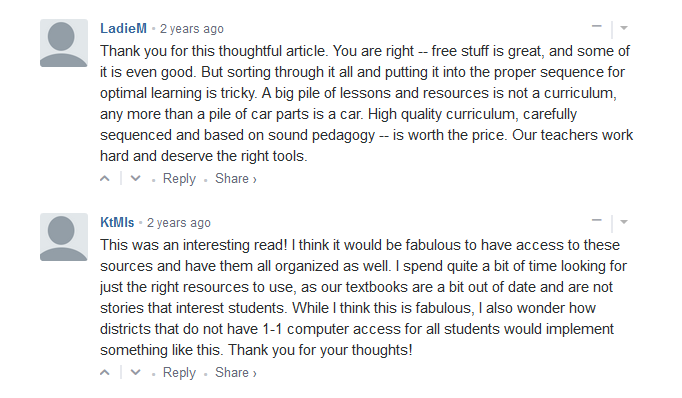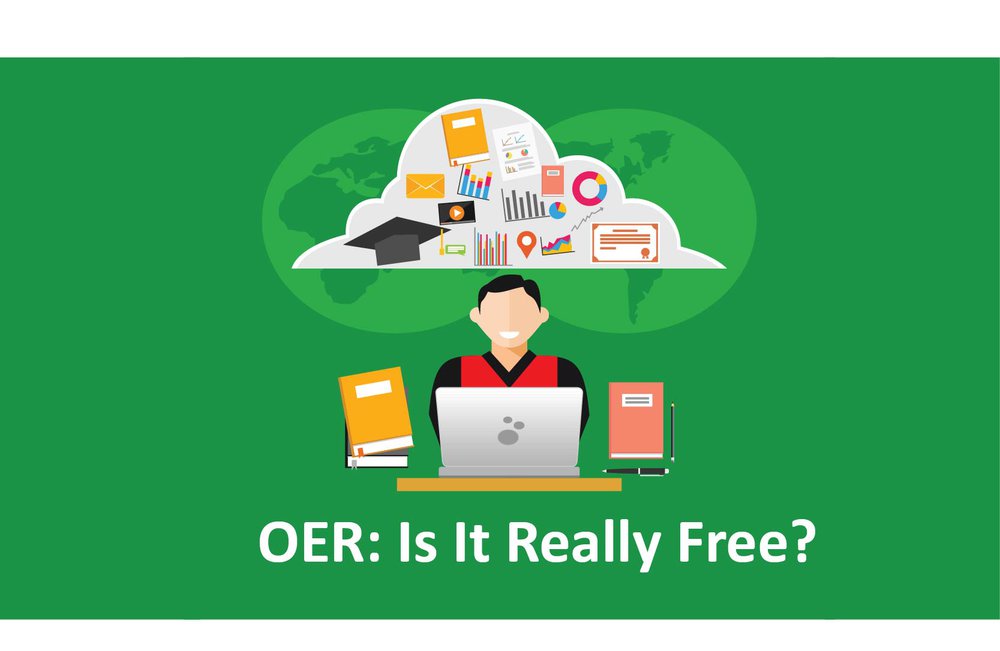The previous week’s article “Are you still going to prefer OER? The $2.28 Billion Loss to Publishers,” brought to light the shortfalls of Open Education Resources (OER) in practice. Now that the software technology is here that can adapt around each individual student, roles and resources can change. To withhold education into an “oh-so-five-years-ago” paradigm of individualize-by-hand the little videos and PDFs and paragraphs of knowledge or old-fashioned courses with “talking heads,” is going to wear on everyone in education quite quickly.
Schools and teachers alike are starting to realize that “Free is like a Puppy.” It’s decidedly not free on many fronts.
Consumers are already exposed to the vaunted likes of Microsoft’s Minecraft, Learning A-Z, Dreambox Learning, Apex Learning, Brainpop, Carnegie Learning, Capstone, Accelerate Learning, and many more. Companies like PowerSchool and Blackboard are making enveloping learning management systems (LMSs) to the “chunked” knowledge objects, OER and some discrete-object Paid Professional Resources (PPR), look like they joined a magical online Disneyland of learning. While different from full courseware or collections sites, there is definitely a leveling up. Now both the framework systems (LMS), and the systematized courseware offerings, allow for customization by teachers, without a whole lot of work. Take that OER.
Design Issue #1
Okay, so I like “free” just as much as anyone. I admit it. But, here’s the real point: the biggest design issue is the fact that most OER is the lowest-common-denominator in digitized materials and will withhold the full potential for millions of students who could be advanced for real by the paid “fully-loaded” immersive digital courseware and customization. Teachers won’t be eliminated, they’ll be highly leveraged. Singapore and other fast-moving nations on the education front will not be so restricted or bashful about using the best-in-class to individualize learning for every student. In addition, in OER sites kids can be exposed to violent movie trailer advertising in can’t-kill-the-video pop-up advertising that goes on, as one example, in a lot of these free sites.
A more correct vision of future ready schools will need teachers as learning “travel planners” and creators of highly experiential activity and collaboration around screen learning, which ideally is less than forty percent of lesson time anyway, and highly efficient. They will not want to be bothered by custom lesson planning for the basics when they are readily available from thrilling software.
It is this schema that is the revolution, and holds within it the potential of every student succeeding to the level of their native ability, and with that reality, the idea of the greatest economic boom in mankind’s history.
Again, OER and free-everything is great, but not when it capitulates to sophistication. It’s also not great to ignore the fact that there are repercussions of a kill-the-profit idea.
Design Issue #2
It’s important to mention that during the tradition of fully scoped-and-sequenced textbooks, school boards were elected in many places to bring accountability for the curriculum directions of institutions, to answer to parents and the public. Yet the mantra of OER presupposes the dissolution of this public trust in most selections. This is because, at a practical level, the hundreds of thousands, if not millions of “bits” of knowledge, when books are displaced and no professional materials replace them, get aggregated at the teacher level. This makes the knowledge bits, in their dispersed state, an invisible-to-management element and typically unreliable force, both for accountability as well as results. It’s fun to say all teachers are true professional curriculum-builders, but we all know that isn’t true universally for the millions of teachers. Many want the old days of “give me my canned curriculum” so they can have some chance of running a class seamlessly.
Having to build-every-lesson-while-teaching, for every subject, is perhaps the biggest shift in the last hundred years. It threatens the continuity of operations in a significant way.
The untethered accountability of what is being taught is design Issue number two. This lays a trap for the future, and puts public education in the path of myriad contentious issues with the public at a time that is particularly fraught with disagreements politically and socially. This is already showing up in the news with stories such as “Teacher Gives Racist Math Quiz About ‘Pimps,’ ‘Ho’s’ And Drug Deals,” including one question that asked young students, “Tyrone knocked up 4 girls in his gang. There are 20 girls in the gang. What percentage of the girls in the gang has Tyrone knocked up?”1 See other references of similar homework debacles by Google search2-6.
Again, in the past, people higher up than the individual teacher made decisions about acceptable texts with long, drawn-out adoption cycles. The individual teacher who wanted to then “chunk” or “alter” the content was ostensibly altering the desired organized pedagogical direction of the adoption. Often those adoptions were more than reviews, they were forcing industry customization of the texts to fit that State. Mr. Culatta, the founding Federal Department of Education “Open Resources” Advisor, and current CEO of ISTE, recently told a story of altering the way he wanted to teach by using free resources, because he had been told he had to be careful of copyright infringement and not alter anything from the paid publishers. This is a normal desire by teachers.
See Video of Mr. Culatta from the ISTE Conference
Many teachers have been demanding “chunked” content for some time, but the issue of institution control is a big one that has gone by the wayside in the exodus from paper to digital. Total freedom without barriers is a risk—not to the wonderful and well-meaning teacher—but to the institution when things get out of hand or worse, results go down.
Right at a time when most American’s already believe there are fully online options, private schools and charters, this lack of oversight could develop into a serious deal-breaker for parents with public education.
Design Issue #3
Design issue number three is how OER will influence teaching and learning by delaying or derailing real technology sophistication. By design the OER initiative presupposes a delivery mechanism of teacher-centricity. It is largely traditional teaching augmented with tech tid-bits created and curated by predominately non-coders, non-UI/UX designers, non-instructional designers, and the generally uninitiated in curriculum mapping.
It’s a set-up to either have the public sector spend billions on custom building competitive software or to build, and rebuild, lesson plans at the lowest end of the digital pool. In addition, teachers have a design tendency to not individualize at the level of machine intelligence, of course. They will “tweak” a lesson for the various learning styles, but certainly not fully individualize one student to study anthropoids while another is studying mollusks or mythology, not even in the same subject. Teachers keep the group together to cut down on their lesson planning. This design hindrance locks in structure and caps technology.
These three design issues are the leadership, organizational and operational problems of today for schools.
The Cost of Free
The future is highly crafted software for learning. Design of digital learning that is free and open is almost universally not professional-software grade. OER is thusly revealed -- it is free and open usually because it is cheaply made. This is not a comment on the learning objects rigor or the knowledge imparted in a bit of video lecture, but on its software sophistication. Free and open may even be a risk due to inadequate software security. Its cost could be incalculable from a liability position.
Free is a great idea if you are in the position to not need to earn your keep and have all the time and money for staffing in the world to create, curate, build, scope, sequence, update, and repeat indefinitely into new digital versions fitting the latest platform language of the day and remaining secure. That work before digital was long delivered by industry but has been laid on the backs of already highly embattled teachers everywhere – at a cost of time and attention. A taxpayer cost. A student cost in attention from their teachers7-17.
Here are comments made to an article by Michele Molnar on Education Week from Jan. 11, 2016 entitled “Flood of Open Education Resources Challenges Educators: Districts seek curation tools for organization.” The article started the dialog with this line: “With millions of pieces of open education resources flooding the Internet, educators face a ‘needle in the haystack’ problem of epic proportions.”
Thus far the industry, even the publishing associations, have been relatively silent, but not consumers. App developers and investors are taking learning directly to parents and students to the tune of billions of dollars in sales. Their products are already in the hands of millions of students who see real craft in digital and high personalization. When students get to school, well, what they will largely see in schools preferring OER are digital objects that are relatively “flat” and merely digitized text and question/answer or read/report.
OER, then, has a cost of potentially losing the public’s interest, further jeopardizing schools.
Several years ago, OER was a way to get a lot of content into an enveloping system by publishers which could then be charged for – fast. However, as the industry advanced beyond “flat” into “gamified” and many algorithms, it has become obvious that the flat world is a stop-gap from a professional view.
I do not think this would be right to do to schools -- leave them with their unsophisticated software view and no warning about where the industry is going.
To understand real screen learning, you must experience it for yourself newly, else you will not see the inevitable direction of the future. Perhaps many still think OER has been a valiant idea and is do-able with scant, but enthusiastic personnel who “burn the midnight oil” to get it all done, unpaid for their overtime usually. I sincerely hope they can achieve competent digital models that remain relevant. I know a couple schools who are trying valiantly, but they pay for extra weeks of teacher time over every summer to rebuild, or live with incomplete digital transition and so straddle the paper and digital line in perpetuity. I’ve challenged them to consider direct purchase and let those teachers have their time off, or more of it. The cost may be equivalent, and then the school can burden the Publishers with demands.
The balancing act between real digital and the atomized bits of knowledge for curation by the masses is here. Schools and teachers have an opportunity to lean heavily on the burgeoning digital industry whilst they pay far more attention to real human engagement activities to remain relevant in the Age of Experience. If learning data and rationale can be largely autonomously personalized and highly efficient, the reason to “go” to a school is going to be experiential. Good tech can be so artfully delivering learning that it fades into the background while project-based hands-on and collaborative work gets into the limelight. That’s what teachers want anyway, and are tired already of digital maneuvering, data entry, and too many tests. When rising campus violence and ideological disagreements with administrations cause a roving eye for choice, edging classroom experience up to great heights is going to be a positive deciding factor in favor of schools for parents.
Experience focus is probably also what is best for students, and the most competitive position for the future of America.
References: 1. Teacher Gives Racist Math Quiz About ‘Pimps,’ ‘Ho’s’ And Drug Deals,” by David Lohr, Huffington Post, 06/01/2016 12:16 pm ET, www.huffingtonpost.com/entry/racist-math-quiz-pimps-hos-drugs_us_574edaeae4b0af73af95d5c0 2. “Teacher suspended over test questions about drugs, guns,” Published June 02, 2016 Associated Press http://www.foxnews.com/us/2016/06/02/teacher-suspended-over-test-questions-about-drugs-guns.html 3. “Common Core’s unintended consequence? More teachers write their own curricula,” Jonathan Sapers, The Hechinger Report February 26, 2015 at 2:07 PM EDT http://www.pbs.org/newshour/updates/common-cores-unintended-consequence-teachers-write-curricula/ 4. “Parents outraged over homework assignment on 'po pimp', by thegrio | January 26, 2015 at 3:35 PM http://thegrio.com/2015/01/26/parents-homework-twista-po-pimp/ 5. “Florida teacher fired over assignment asking students ‘how comfortable’ they are around black people, Arabs,” Thursday, April 6, 2017, 1:59 PM,, Jessica Schladebeck, NEW YORK DAILY NEWS, http://www.nydailynews.com/news/national/florida-teacher-fired-racist-offensive-assignment-article-1.3025267 6. “Staten Island Father Furious Over Homework Assignment Slamming Trump,” February 16, 2017 6:49 PM, CBS New York http://newyork.cbslocal.com/2017/02/16/trump-homework-assignment/ 7. New OER Survey: The disconnect between faculty caring and assigning” by Phil Hill, Posted on July 26, 2016, eLiterate, http://mfeldstein.com/new-oer-survey-faculty-disconnect-2016/ 8. “No More Pencils, No More Books, Artificially intelligent software is replacing the textbook—and reshaping American education.,” By Will Oremus http://www.slate.com/articles/technology/technology/2015/10/adaptive_learning_software_is_replacing_textbooks_and_upending_american.html 9. “The Deconstruction of the K-12 Teacher, When kids can get their lessons from the Internet, what's left for classroom instructors to do?”, The Atlantic, Michael Godsey Mar 25, 2015 https://www.theatlantic.com/education/archive/2015/03/the-deconstruction-of-the-k-12-teacher/388631/ 10. “Reinventing Curriculum: So, When During the School Day Should Teachers Create Curriculum? OER – Open Education Resources – are on the rise, but may increase the workload for instructors,” by Cathie Norris, Elliot Soloway 04/05/16 https://thejournal.com/articles/2016/04/05/school-day.aspx 11. “If Instruction Matters So Much, Why Don’t Teachers Get Time to Plan It?,” by Max, October 25th, 2013 http://mathforum.org/blogs/max/if-instruction-matters-so-much-why-dont-teachers-get-time-to-plan-it/ 12. Things First-Year Teachers Should Do Immediately (Get a Canned Curriculum), By Deborah Chang, HuffPost, Jan 25, 2015, http://www.huffingtonpost.com/deborah-chang/5-things-firstyear-teache_b_6166002.html 13. Is OER really free? Randy Wilhelm, December 19, 2016 http://www.smartbrief.com/original/2016/12/oer-really-free 14. How the Internet Is Complicating the Art of Teaching, Educators design lots of lessons and other learning resources, and increasingly they’re being shared online—often free of cost and in ways that are too personalized to be universally applicable., Franka Bruns / Reuters, Abigail Walthausen Oct 26, 2016 https://www.theatlantic.com/education/archive/2016/10/how-the-internet-is-complicating-the-art-of-teaching/505370/ 15. The Death of Textbooks? Artificially intelligent software is reshaping traditional teaching materials—but it's unclear what the new technology will take away from the learning experience, Terrance F. Ross Mar 6, 2015, https://www.theatlantic.com/education/archive/2015/03/the-death-of-textbooks/387055/ 16. Amazon Inspire Removes Some Content Over Copyright Issues, By NATASHA SINGERJUNE 29, 2016 https://www.nytimes.com/2016/06/30/technology/amazon-inspire-removes-some-content-over-copyright-issues.html 17. “Curricula Provider Great Minds Suing FedEx Over OER,” By Richard Chang 10/05/16 https://campustechnology.com/articles/2016/10/05/curricula-provider-great-minds-suing-fedex-over-oer.aspx











